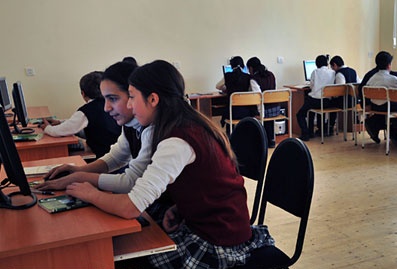Azerbaijan promotes distance learning, but children's Internet access needs control

By Nigar Orujova
A new Internet portal for children will be created in Azerbaijan in the coming months to broadcast educational TV programs, the Education Ministry's ICT Bureau head Samir Mammadov said Tuesday, adding that the ministry has launched the implementation of the Tehsil TV (Educational TV) project.
"The project's primary goal is to inform Azerbaijani population of the country's educational programs, projects and overall situation in the Azerbaijani education system, including news and lessons," Mammadov said. He said the portal will be a platform for all those involved in the process of education -- teachers, schoolchildren and their parents.
Under the project, the Education Ministry has ordered recording a number of programs and lessons for the portal, while signing a contract with a studio to record such programs on a regular basis is still ahead.
"The project, implemented in the frame of the state program on the education system's informatization, will be presented in the near future," Mammadov added.
The use of the Internet for educational purposes is invaluable, as the Web can easily provide a schoolchild with all the required information. However, schoolchildren' Web usage should be controlled by parents and teachers.
According to the head of the State Committee for Family, Women and Children's Affairs, Hijran Huseynova, the government should take substantial action to limit the use of the Internet by schoolchildren.
"The use of the Internet in order to improve the education of children is positive, but on the other hand, through the Internet, children have access to unnecessary information," she commented. "Moreover, this leads to serious problems and causes dangerous results. In this issue, first of all, parents need to be in control. At the same time, a serious approach should be exercised at schools."
A package of amendments and addenda to the domestic legislation has been drafted to ensure control over children's use of the Web both at Internet cafes and at home, chief adviser for the State Committee, Parviz Aliyev, said on Monday.
The committee has conducted monitoring in Internet cafes to examine the situation in this area. The results showed that children were going to "Internet clubs" during lessons and visit websites with negative impact, Aliyev said.
"The monitoring revealed that sometimes children do not go to school day after day and spend time in Internet cafes," Aliyev said. "Parents think that children are at school while the school does not inform parents about their children's absence. Parents [often] are not interested in their children's school attendance, they do not build relations with the school. The monitoring revealed that 15 schoolchildren were at Internet clubs during lessons."
Some of the proposals made pertain to age limits for children's access to Internet cafes, the time spent there and websites they should be allowed to visit.
According to Aliyev, it is also proposed to install cameras in Internet cafes to keep track of visitors during the day.
Fines are envisioned for Internet cafes violating these requirements and parents who do not supervise their children. The Internet cafes ignoring warnings will face administrative penalties and may be closed.
According to Aliyev, the proposals also envision Internet service providers' applying filters for children who use the Internet at home.
Aliyev said the package of proposals has been submitted to the Ministry of Communications and Information Technologies.
After receiving suggestions from respective agencies, the Committee will prepare final draft amendments to the relevant law.
Parental and governmental control
A lack of internet skills among parents could harm their children. However, restrictions on Internet use are not the way out. Otherwise, poor knowledge of the Internet may have a negative impact on children's education and employment opportunities.
Parents should examine their children's use of the Web to be sure that they use it properly. There are a number of websites with sexually explicit information, which can be detrimental to a child. Moreover, some dangerous and suspicious people who come to chat rooms may be a threat to minors.
Even if parents are Internet-illiterate, there are some tips to protect the child from offensive content on the Internet. Parents should control how much time their children spend on the Internet and enquire what they do online.
Microsoft, the world's largest software company, is also concerned about Internet safety. In association with the American Academy of Pediatrics, Microsoft has developed age-based guidance for Internet use with family safety settings, which is available on the company's website.
Notwithstanding modern Internet filters, guidance by parents who know their child and his or her habits best is more helpful to protect children.
Here we are to serve you with news right now. It does not cost much, but worth your attention.
Choose to support open, independent, quality journalism and subscribe on a monthly basis.
By subscribing to our online newspaper, you can have full digital access to all news, analysis, and much more.
You can also follow AzerNEWS on Twitter @AzerNewsAz or Facebook @AzerNewsNewspaper
Thank you!
